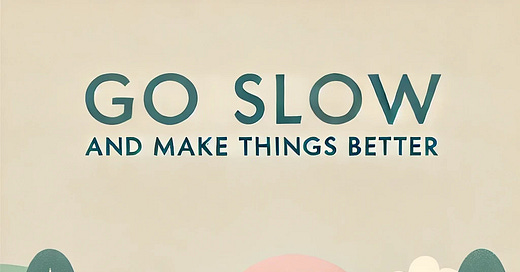As someone who has dedicated my entire career to emerging technologies, I believe we must evolve our approach to innovation, particularly when it comes to AI and other transformative technologies. The tech landscape is full of lessons from history—take Facebook's early days as a cautionary tale.
Facebook's rapid development and business model led to consequences like information bubbles, disinformation cycles, surveillance capitalism, and a corrosive attention economy. These outcomes have had severe negative impacts on society. Today, as AI continues to mature, it's critical to adopt a strategy that prioritizes thoughtful progression rather than hasty implementation.
Instead of the brash directive "Move Fast and Break Things," let's embrace a new mantra:
Go Slow and Make Things Better
Having been involved in several tech startups, I do understand the real benefits of moving fast: making space to do crazy things, getting quick results, and generating excitement. But I think there also benefits to moving slow and this is what I’m advocating for this technology, and for this moment.
I’ve been inspired by the “Slow AI” movement being explored by the Dutch organization AIxDesign. They draw from other counter-movements such as Slow Fashion and the Italian Slow Food initiative, which aim to subvert solutionist corporate-first thinking and push towards principles such as:
Good: quality, flavorsome and healthy food
Clean: production that does not harm the environment
Fair: accessible prices for consumers and fair conditions and pay for producers
To these, I would add:
Human: Appealing to non-rational emotions and social interaction
Contemplative: Allowing for the savoring of life and following intuition
Quality: Recognizing the value of quality and hand-crafting
So what can Go Slow and Make Things Better get us? First and foremost, it can help provide the time and opportunity to proceed with care. I’d like to achieve the following for AI and other emerging tech (Quantum Computing is coming!):
Foreground the key role that design and its methods should play in development
Do hard things and think big
Make things that are enriching and meaningful through play
Avoid feature creep by making room for distillation, marination, and refinement
Research unexpected opportunities and risks
Avoid breaking important things
Do lots of experimentation and tinkering
Hire good people and foster productive collaborations
Build a sustainable and ethical business
Engage with society to create impact for the greater good
Reid Hoffman (co-founder of LinkedIn) typifies the go fast attitude and recently opined in the New York Times that “AI Will Empower Humanity”:
“Decades from now, as you try to remember exactly what sequence of events and life circumstances made you finally decide to go all-in on Bitcoin, your A.I. could develop an informed hypothesis based on a detailed record of your status updates, invites, DMs, and other potentially enduring ephemera that we’re often barely aware of as we create them, much less days, months or years after the fact.”
I find this offensive and counter to my vision for the future. Not only because of the Tech Bro, libertarian, right-wing slant of Bitcoin, but because I have no interest in being so self-absorbed in my quantified life. Ick.
Hoffman’s piece reminds me of my 2007 critique of Adam Greenfield’s book “Everyware” which extolled the future that IoT would bring. In it he imagined that the house of the future would sense our moods and turn on calm lighting to relax us if we had a bad day.
Honestly, I really don’t want my house thinking for me in this way. I’d rather just set my own lighting and talk to my wife who can support and empathize since she knows me better than I or any AI could. This is because she has lived experience that would help me gain insight instead of pushing my shitty feeling away with mood lighting.
To wit: given my long experience in emerging technologies, I’ve been looking back over my career for significant patterns and how they may help us successfully move forward. A few insights from this thinking are coming in my next post where I’ll talk about emerging-tech patterns, lessons, and some new directions for AI.
Note: some of this post was written in collaboration with locally run DeepSeek R1.
#Innovation #EmergingTechnologies #AI #TechLeadership #FutureOfTechnology





